Once you've decided to start learning guitar, the first step will be to actually get one.
At first sight, guitars have mysterious specifications and technical jargon that you won't be able to comprehend, so it can be a daunting process for a beginner who doesn't have a clue about anything guitar-related.
To make things a bit simpler for you, here is a detailed guide on buying a first guitar, based on my 30+ years in the field.
1. What type of guitar is right for you?
There is a never ending debate on whether you should get an acoustic or an electric guitar as your first guitar. In short, there are 2 main categories of guitars you can choose from:
Acoustic guitars
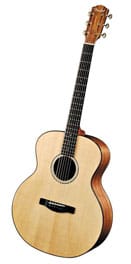
Acoustic guitars only use acoustic means to transfer the vibrational energy of their strings to produce a sound. What happens is that the string's vibration is passed on into the body of the guitar, and the space there amplifies the resulting sound, which is let out through the soundhole.
You can subcategorize acoustic guitars further:
- Nylon-stringed classical guitars: Known for their nylon strings, classical guitars are a favorite among beginners due to the softer feel of the strings, which are easier on the fingers. These guitars produce a warm, mellow sound that is synonymous with classical and flamenco music. They have a wider neck, which provides more space between strings, aiding fingerstyle playing.
- Steel-stringed acoustic guitars: In contrast, steel-string guitars, which are common in folk, country, and rock music, produce a brighter, louder sound. They have a narrower neck, which can be more comfortable for strumming but might be challenging for intricate fingerpicking.
Understanding these differences is key when choosing an acoustic guitar. While classical guitars offer a gentler introduction to playing, they are meant for playing mainly classical music. Steel-string guitars are more versatile across various music styles (pop, rock, etc.), but require a bit more initial finger strength.
Electric guitars
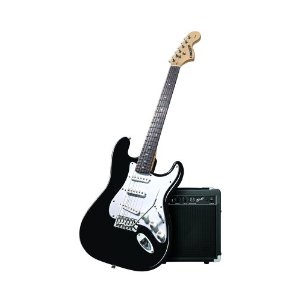
Electric guitars use a pickup to convert the vibration of their strings into electrical impulses. This signal is sent to an amplifier, where the strength of the signal is amplified, and then sent to the loudspeaker integrated into the amp box..
If you opt for an electric guitar, you will also need to buy an amplifier. As a beginner, a small, user-friendly amp is enough. Look for one that offers clear sound quality and a few basic effects like reverb or distortion.
There are literally thousands of different acoustic and electric guitars, so choosing one can be a bit difficult. We'll get into the specifics of how to choose your first beginner guitar further down in the article.
Is an acoustic or electric better for beginners?
Go ahead and read this article, where you'll find out the pros and cons of both types of guitars. Electric guitars are easier to play because of their lighter strings, but if you initially learn on an acoustic, you'll be a better guitar player.
If you are still uncertain, ask yourself, "What kind of music do I like?". Get the type of guitar that fits your musical taste, you can't go wrong with that.
2. What size guitar do you need?
The size of a guitar is a critical factor to consider, especially for comfort and playability. Here’s a brief overview of common guitar sizes so you can choose the one right for your age:
- Full-Size Guitars: The most common size for adult players. It offers a full range of notes and richer sound quality and is suitable for most styles of music.
- 3/4 Size Guitars: About 75% the size of a full-size guitar, this size is perfect for children aged 8-12. It has a shorter neck and a smaller body. Younger players need this size, but adults with smaller frames can also use it. It's easier to handle and play than a full-sized guitar, so it might suit some adult beginners better than a full-size model.
- 1/2 Size Guitars: Designed for very young learners, usually children aged 5-8, these guitars are significantly smaller. Their small size makes it easy for young hands to navigate the fretboard.
3. How much to spend on your first guitar?
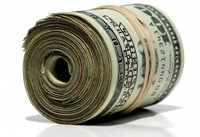
You can spend all the money in the world on a guitar. Trust me. Been there, done that 🙂
For your first guitar though, a reasonable amount to pay is between $200-$500.
The reason you don't want to buy a guitar cheaper than this range is that guitars under $150-200 are mostly garbage. Sorry to be blunt, but that's the truth. They are manufactured in Asian sweatshops, and as such, are basically low-quality firewood at best.
You could spend more than the range I recommended above if you have the budget. The more you spend, the better your guitar will be, as more expensive guitars have a better tone, are easier to play, and have more design features that make them more beautiful (pearl inlays and around the soundhole, nicer binding, headstock, etc.)
But what if you don't like playing? Unfortunately, lots of people quit learning guitar after a few months, and I'm sincerely hoping you won't be one of them. But know that you can sell your guitar if you want at any time. You will not be able to sell it at the new price of course, but used-like-new guitars go for 85-90% of new guitars, so your loss won't be that large.
So if you have the cash, there are worse ways to spend your money.
Considering Guitar Brands
When picking your first guitar, don't overlook the brand. Each brand, like Fender, Gibson, Yamaha, and Epiphone, can bring something unique to the table.
For instance, Fender and Gibson are famous for their iconic electric guitars, while Yamaha and Epiphone are known for offering great value, especially for beginners. The brand name might not be everything, but it can guide you toward a guitar that matches your needs in terms of style, quality, sound, and budget.
4. Where to buy it?
You might be tempted to buy your new guitar online since prices will be lower. The problem is that if you buy it online, you won't have anyone helping you, you can't test the guitar, and you can't discuss your needs with an expert.
I highly suggest you buy your first guitar at a local dealer, preferably a respected guitar shop. Some of you might say,
Hey, I'll go to the guitar shop, talk with the salesman, test all the guitars, and I'll just buy it online in the end.
Well, you could do that, but come on... Respect the knowledge and work they put into their business, and spend that extra $30 at the shop.
In all my years playing guitar (20+), I've never bought a new guitar online. It's much more fun and a better experience to buy it at the store.
Other than that, you can meet other guitar players at stores, and maybe set up a joint practice session or trade tips.
5. Buying a used guitar as a first guitar
I don't recommend this to beginners, since buying a used guitar will be a gamble. Beginners don't know what to check on used guitars. It takes lots of experience and knowledge to be able to tell whether a used guitar is good or not.
Unless you have a knowledgeable friend who can help you out on this front, stay away from used guitars at first.
6. Accessories you will need, other than the guitar
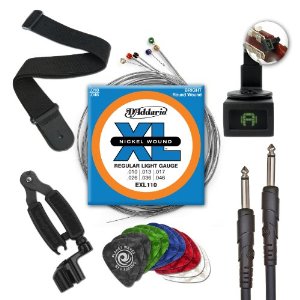
Here is a list of guitar accessories beginners will need. You don't need everything on that list, the most important things are:
- Electric tuner
- Capo
- Guitar stand
- Picks
- Gig bag (if you plan on taking private lessons and need to haul your guitar around)
If you end up buying a beginner guitar package, that will already include most of the things on the shopping list. I don't really recommend buying all-in-one guitar sets, they are usually low quality and a waste of money. Think about it. They sell for $100-$200, you can't possibly include everything for that price, and have it be of decent quality.
It's better, and more fun to choose the things you need yourself. It will cost a bit more, but it's worth it.
7. Knowing all the above, how do you pick the actual guitar?
Ok, so this is where the fun begins. You walk into a guitar shop, take a deep breath, and take in that new guitar smell. It's like drugs for guitarists.
Find yourself a sales clerk, and tell him/her why you're there. Then head on over to the acoustic or electric guitar section, and start looking around. If any guitar catches your eye, ask the salesman to take it down for you. It is very important to compare guitars and choose one aesthetically pleasing for you, so one which you find beautiful.
The more you fall in love with the guitar, the more you'll be enticed to play it at home.
Ask the store salesman to:
- Make sure it's in tune,
- Tell you a bit about the guitar,
- Play the guitar a bit.
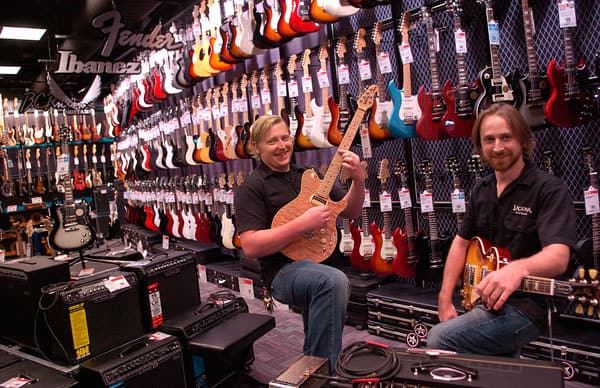
Sit down, grab the guitar, put it into the playing position, and see how it feels. Obviously, you won't be able to play it, you just want to see how holding it feels. If the body of the guitar is too big or too small, it will feel awkward.
You'll know you're on the right track if you get goosebumps, I always do with a new guitar that I'm going to buy 🙂
Now put the guitar back, grab your salesman, and make him show you a few more beginner guitars, repeating the above. Don't be afraid to spend a lot of time at the store, there's no rush.
8. Get your new guitar set up at the store
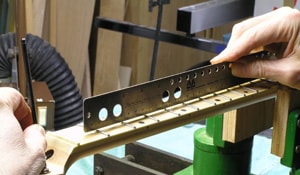
Once you've selected your new baby, you'll want to ask the salesman to get it set up for you. Most guitar stores have a luthier or someone who does guitar setups, which will cost $25-50 extra.
Why do you need to set up a new guitar? Good question!
When a lower-end guitar ships from the factory, it is not set up optimally. The fret edges might be sharp, the action too high, the intonation off, etc.
When you have your guitar set up, you're getting all of these things checked and fixed, plus new strings, so your guitar will play better. This is really important not just for beginners, but for players of all levels.
High-end guitars don't need a setup, as they are individually inspected and set up during manufacturing.
9. Learning to play your guitar
So you have your new beauty, it's set up correctly, and sitting on the stand in your room. Now what?
1. Personal lessons
Personalized attention and immediate feedback are the main benefits of a private guitar teacher. However, this option can be quite costly and less flexible in terms of scheduling. A 45-minute lesson typically costs $50, so having 2 lessons per week will set you back $5200 per year.
2. Teach yourself guitar online
The internet is flooded with guitar lessons. Some are great, some are not.
But if you find a course that you stick with and don't just jump around random YouTube videos, you will learn guitar faster than with a teacher.
Online lessons have many advantages over live teachers:
- Occasions: You can access the course as many times per week (or per day) as you like, so you can progress faster than with a live tutor who you only see 2x a week.
- Flexibility: Learn at your own pace and on your own schedule.
- Variety: Access to a wide range of lessons covering various genres.
- Affordability: Online courses are way cheaper than regular personal lessons.
- Community: Many online platforms have forums or communities where you can share experiences and tips with fellow learners.
Here are a few sites that have great lessons for beginners:
- GuitarTricks.com
- TheGuitarLesson.com (this site)
Try them, they both have free trial periods. Just remember to stick with a single course, practice every day, and send me your first album on Spotify down the line 🙂

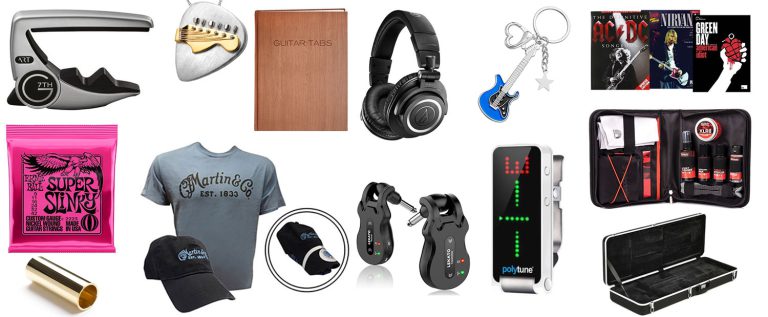
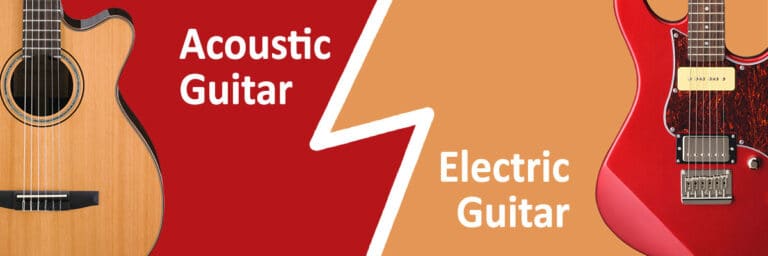
I’m not sure I understand point #5. How do you assess the quality of a used guitar if you’re a complete beginner? What should I be looking for exactly?
As I said in the article, I don’t recommend this to beginners, unless you have an experienced friend to help check the condition of the guitar.
I’m torn between acoustic and electric for starting out. Does the style of music I eventually want to play make that much of a difference? Can’t I just start with any guitar and switch later on?
Yes, definitely. You will get loads of guitars if you stick with it, we all do 🙂
The reason it’s a good idea to get a guitar that can be used to play your favorite musical styles is that it helps motivate you to play.
Just bought my first guitar last month and it’s been amazing. Your tips would have been so helpful, especially the budget range. I spent just over $300 and feel like I got a great deal. It’s a steel-stringed acoustic and I absolutely love the sound it makes. Thanks for confirming I made the right choice.
Great article, Tom. As a seasoned guitarist, I have to emphasize the importance of a good setup for your first guitar, as mentioned in tip #7. Beginners might not know that action, intonation, and string gauge can dramatically affect playability. A professional setup can make even an entry-level guitar a joy to play, and start a beginner off on the right foot.
I totally agree. The first ever electric guitar I bought was inexpensive and not that great, but I took it for a pro setup, and it became a totally different guitar. There are things that only a pro can do which most people don’t even think of, like filing the sides of the fret wires to make it more comfortable to play. So a pro setup is not just about setting the intonation, it brings a lot of positives.
I kind of got into playing by accident when I picked up a $75.00 at a pawn store. (The same guitar today would probably run $125.00. Long story short; pawned it once for $25.00; redeemed it and got caught in a heavy rain storm that was about to go through the case and ruin it, so headed for shelter to save it bit had it stolen on the way anyhow. Got a another for 2 or 3 bills and have had great luck with my new one. (Used.) It takes a long time and a lot of luck to get through, but it’s worth it. Be patient and keep at it. Takes years.
You shouldn’t need to pay extra to get a new guitar set up. The better local shops will set up their guitars because we’ll set up instruments feel better to play and sell faster. I’ve asked for a guitar to be adjusted in the shop before deciding my opinion of it and it was done no questions.
I don’t think a real setup would be for free. Just checking a few things like intonation and tuning is one thing, but a proper setup involves many more things.
I’ve been playing bass for twenty five years. I just bought a Martin D-18 and love it. I kinda jumped in with both feet.
Wow that’s an impressive guitar, congratulations James! Have fun with it and play it a lot!
Thanks for explaining how learning an acoustic guitar first will make you a better guitar player. My son recently enrolled in a guitar lesson along with his cousins. He currently borrows his guitar form the instructor, and I think he’ll need his own soon. I’ll be sure to get him a nice, beginner-level acoustic guitar first before splurging on quality electric guitars.
Thanks for this article, it helps. It’s tempting to buy a guitar online, since you can usually get one cheaper than at a brick and mortar guitar store, but as you said, there is a trade off. I’m totally new to the guitar, but I’ve always thought it was cool, so I’ve decided I will go on the “guitar journey”. Looking for a nice beginner electric guitar, since I like rock and blues the most, but I’ve been hearing a lot of acoustic guitars in pop songs lately.
I started playing the guitar at the age of 12. It’s really my greatest hobby and it took me a lot of patience to learn it just by myself. I found it interesting when you said that buying the guitar which I really like will cost a bit more, but it’s worth it.
Excellent article. I’ve been playing guitar for several years. And it was very difficult for me to buy the first guitar. Now I know a little more and would like to add some tips)) First you need to decide, what type of guitar do you need. Acoustic guitar, electric guitar or, perhaps, a bass guitar. Also for a beginner, there is not much difference between a professional guitar or not professional. Any professional guitar can easily be used for training. But do not look for a special guitar, designed specifically for learning! Also, for starters, it’s very important to pick the right strings and replace them after buying a guitar! Since the guitar can have cheap strings. In addition, steel strings can damage your fingers. I hope this advice will be useful))
I do like that you recommend getting the guitar setup at the store in your article. After all, it can be very difficult to figure out how to properly set up your guitar, especially if you’re a first-timer. Fortunately, most guitar stores are staffed by people who love music and know how to work the instruments so they can definitely help you out.
ty, it really help a lot about guitar. I probably like u had said drop a ton of money on those baby, but hey it’s worth it, isn’t it ?